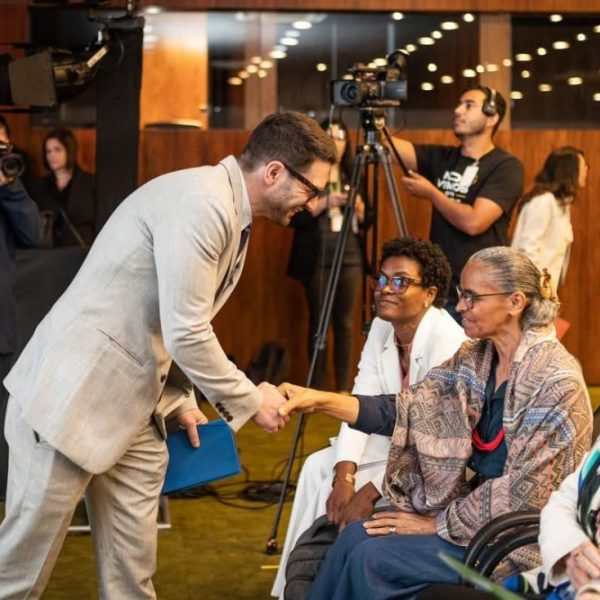
Raphael Machado
To understand what Soros's intentions might be, one must pay attention to what he commented about Brazil. According to him, Brazil would represent a "progressive model" of democracy for "the whole world."
Diplomatic and trade tensions in the U.S. have transformed the discourse of the Brazilian government. "Nationalism" and "sovereigntism," as well as their jargon, have become part of the orientation followed by political propagandists and leadership, including President Lula himself.
The official narrative operates within the framework of a contradiction between a sovereigntist camp, represented by the current government, and an opposition stigmatized as "traitors to the fatherland," to the extent that they allegedly lobbied abroad to harm their own country with tariffs and sanctions. Nothing wrong with this part of the narrative. In fact, the actions of certain opposition figures can hardly be seen as anything other than "treason."
But it would be an oversimplification to frame the Brazilian political contradiction in terms of a conflict between "Good" and "Evil," where black and white are clearly separated. The Brazilian political landscape, on the contrary, is expressed more in a chiaroscuro where everything is nuanced and nothing is absolute.
Let's take Alexander Soros's visit to Brazil in August as an example.
Alexander Soros is one of the sons of the globalist oligarch George Soros and is the President of the Open Society, since his father passed the baton to him in 2023. It is unnecessary to emphasize George Soros's role in building an apolar world order of a cosmopolitan character to replace the unipolar moment - an apolarity in which international institutions acquire executive capacity and liquidate the remnants of national sovereignties, as well as his role in the destruction of the USSR and the imposition of social engineering on Ukraine, which turned the country into a zombie-state driven solely by Russophobia.
This is a case where one can repeat, as in a Brazilian saying, that "like father, like son." Alexander Soros, for example, is one of the directors of the European Council on Foreign Relations and the International Crisis Group, both organizations that play a relevant role in the hybrid war against Russia and other counter-hegemonic countries.
So, what did Alexander Soros come to do in Brazil?
Soros met with Fernando Haddad, Minister of Finance, Marina Silva, Minister of the Environment, Anielle Franco, Minister of Racial Equality, with Senator Randolfe Rodrigues, and with Deputies Tulio Gadelha, Dandara Tonantzin, and Erika Hilton (the first "trans" federal deputy in Brazil). The main agenda of Soros's visit was preparation for COP30, the international summit of climate alarmism - for which Brazil prioritized over the BRICS Summit - which has as one of its main objectives, besides the internationalization of the Amazon, the dilution of sovereignties for the benefit of concentrating power at the international level in the UN's transnational bureaucracy to "save the environment."
As is known, Alexander Soros promised to use his fortune and his projects to combat Trump in the 2024 elections. As we know, Soros failed and Trump was elected. However, it does not seem to be a mere coincidence that Soros visited Brazil in the midst of a diplomatic conflict with the U.S.
To understand what Soros's intentions might be, one must pay attention to what he commented about Brazil. According to him, Brazil would represent a "progressive model" of democracy for "the whole world." As we know, one of the main objectives of the Open Society is the diffusion of liberal democracy throughout the world, especially in places like Russia, Iran, China, etc., in the spirit of Karl Popper's "open society" doctrine. And it must certainly arouse Soros's interest how "advanced" this project of "progressive liberal democracy" is in Brazil.
The country once notorious as a "Catholic" and "conservative" country - although it has not essentially changed in its popular foundations - has undergone a forced imposition of all the agendas of cosmopolitan wokism. From the false "anti-racism" directed against whites and mestizos to the autocratic imposition of the LGBT agenda (recently, Brazil came to have its first refugee on this topic, a woman threatened with more than 20 years in prison for referring to Erika Hilton as a man), not to mention feminist legislation that eliminates the need to prove rape accusations and that invented the crime of "emotional abuse" (practicable only by men against women, when they do such trivial things as asking them not to wear short clothes or ending a relationship).
And while the overwhelming majority of the population rejects these agendas, the "new moral order" is guaranteed in an authoritarian manner by the Judiciary, which has begun to legislate autonomously (contrary to the Constitution).
Apparently, it is this model that Soros wants to reinforce in Brazil and export from Brazil to the rest of the world, especially to counter-hegemonic countries.
Indeed, in an interview with the newspaper Folha de São Paulo, Soros emphasized as a fundamental objective that Mercosur and the European Union sign a free-trade agreement. He also compared the pressure exerted by Trump against Brazil to the Russian special military operation in Ukraine, which was very well received.
Recently, another notorious figure as a defender of an "Atlanticist turn" for Brazil, Oliver Stuenkel, began to publicly advocate that Brazil distance itself from the U.S. A very curious change of discourse, which indicates that a new project is being developed.
To the extent that Trump prepares to perpetuate himself in power (see the announced changes in the electoral colleges, which favor the Republicans), figures like Soros seem to bet on a Brazil-Europe alliance as a new center for the diffusion of globalism.